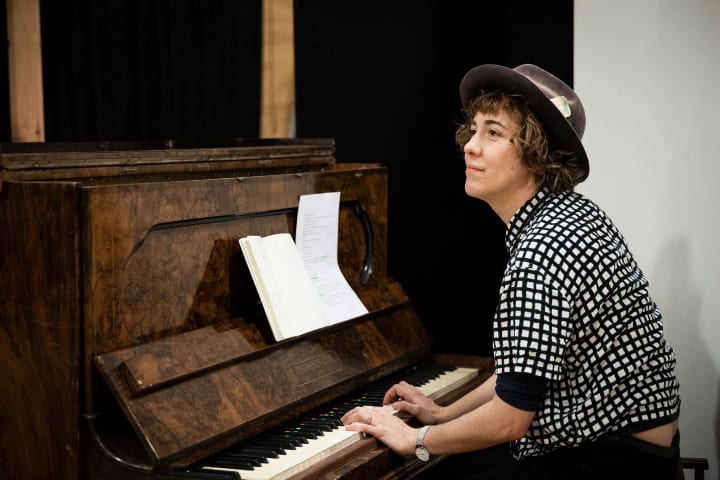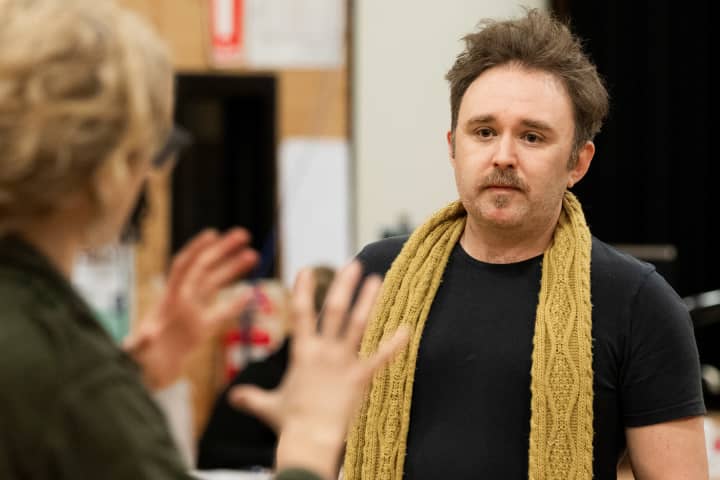To reach a show’s opening night, writer and actor Virginia Gay tells me, requires an enormous amount of momentum. In fact, it is a point that Director Sarah Goodes told her. ‘Everybody swings together,’ she says relaying Goodes. ‘There’s a huge run up and we all hit it at the same time on opening night.’ But last year the company of Cyrano were left suspended when the show’s opening night performance was cancelled a mere 4 hours before it was due to start. ‘To have that momentum slowly dissolve away is a very curious kind of grief,’ Gay reflects.
I am speaking to Gay six days after Cyrano’s opening night, when the team’s momentum that was put on hold for 1 year, 1 month, 3 weeks and 4 days finally reached its crescendo. ‘People kept sending me messages on the day of our new opening saying, “Congratulations, you’ve opened!” and I was like, “You wait until we have actually opened. Don’t you curse us”,’ Gay jokes. When I ask how it feels to finally open, it is the audience’s reaction that is at the front of her mind. ‘It felt exhilarating,’ she says. Especially the moments in the show that are ‘just pure, live, audience joy – they are a great joy to perform every night. To ride the laughs with them.’
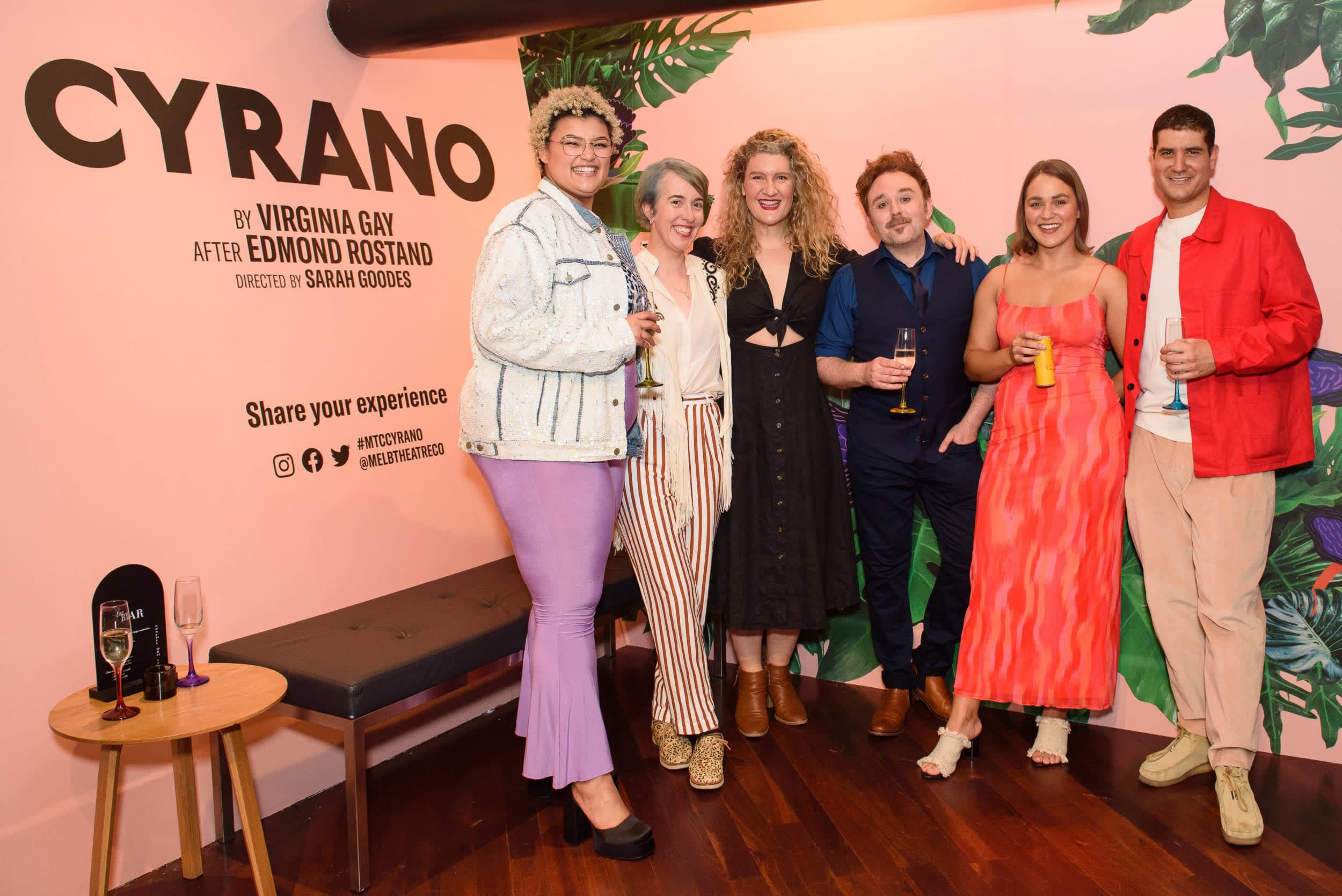
The cast of Cyrano on opening night. Photo: Heath Warwick
For Director Sarah Goodes – who I spoke to a few hours before opening night – though heartbreaking, the postponement has, in some ways, better served the spirit of the show. ‘We were always hoping that the piece would open just as we came out of lockdown, which it was going to. Instead, we went back into lockdown. But the big thing was that we could only perform in front of 80 people with masks on, and the piece really needs a full audience. So it’s a much better time to be doing it,’ Goodes explains.
With the time that has passed, I’m curious to know whether the show has taken on any new meanings for either of them. ‘Strangely, it became a more intimate show,’ Goodes says. ‘But the big kind of universal themes of an ode to joy, a coming back together and coming home, of what theatre is and the interaction between audience and performer are still the same.’ And she credits this to Gay’s writing. ‘Virginia has this innate generosity and energy – her heart seems to open up, which in turn opens up the hearts of audiences. She’s written it very specifically for that, and in how she performs and what she brings out in the other performers.’
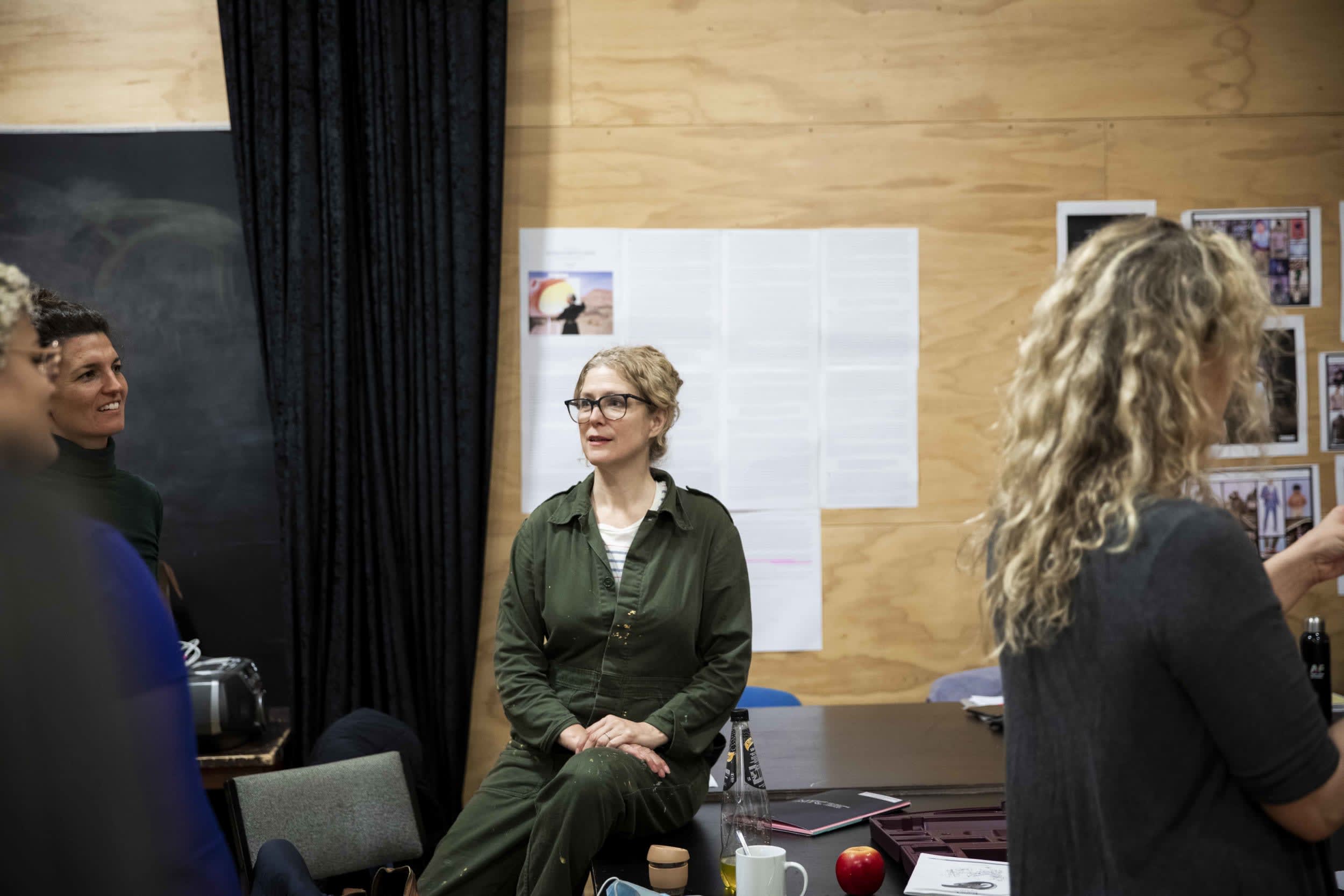
Sarah Goodes in rehearsals for Cyrano. Photo: Charlie Kinross
Though the show directly speaks to the feelings we all had during the pandemic around isolation and longing, the interesting thing that struck Goodes is how the ideas explored in the play are universal and timeless. For one, the idea of learning how to live again. ‘After we go through trauma, in a way, you need to be taught how to live again and to be open, to be open to chaos and to the mess of life, which Virginia's captured beautifully in the piece.’
Similarly, for Gay, the distance from the origination of the work has allowed it to become about so much more. ‘Because the pain is less acute, it’s become something of an exploration of that time rather than a eulogy or a pain that is sharp,’ she says. She recalls during the three preview performances last year the sense that everybody felt the piece was – ‘not to use a phrase that is ridiculous’ – so on the nose. ‘It was so acutely about that time.’ But now, ‘it’s something that is broadly about the apocalypse, and also about the longing that we all feel throughout our lives – it’s become less acute and more universal.’
It’s ultimately a show about the courage it takes to connect. ‘You can’t live without connection. You can’t live without reaching for other people, even though it hurts and even though your heart gets slapped away,’ Gay says. ‘You have to keep reaching and the courage that it takes to keep reaching even as you keep experiencing trauma is the true courage. Learning to unlearn your trauma, I think, is maybe one of the things that a bit more distance has allowed us to see that that’s what this show is about.’
Learning to unlearn your trauma, I think, is maybe one of the things that a bit more distance has allowed us to see that that’s what this show is about.’ – Virginia Gay
The universality of Cyrano is perhaps not surprising considering it’s an adaptation of a story we have told since 1897. For Goodes, Gay’s adaptation raises the question about what stories do we tell? ‘It proposes this question of do we want to keep telling the old stories if they perpetuate myths and ideas that we’ve outgrown? But it also says, the universal aspects of and the human dilemmas inside these stories are worth holding on to because they’re timeless and universal.’ Gay has succeeded in doing just that in her Cyrano. ‘Virginia has maintained the universal emotional dilemmas and then built a scaffold around it and made it into a piece that’s much more meta, about today and ultimately much more playful.’
Gay agrees. ‘Absolutely. And I think one of the things that is most important is if we are going to keep telling old stories, then we have to give it to new, young, diverse voices to do that. Otherwise, then you’re just going to get the same old stories, the same orders of power being reiterated by the same storytellers.’
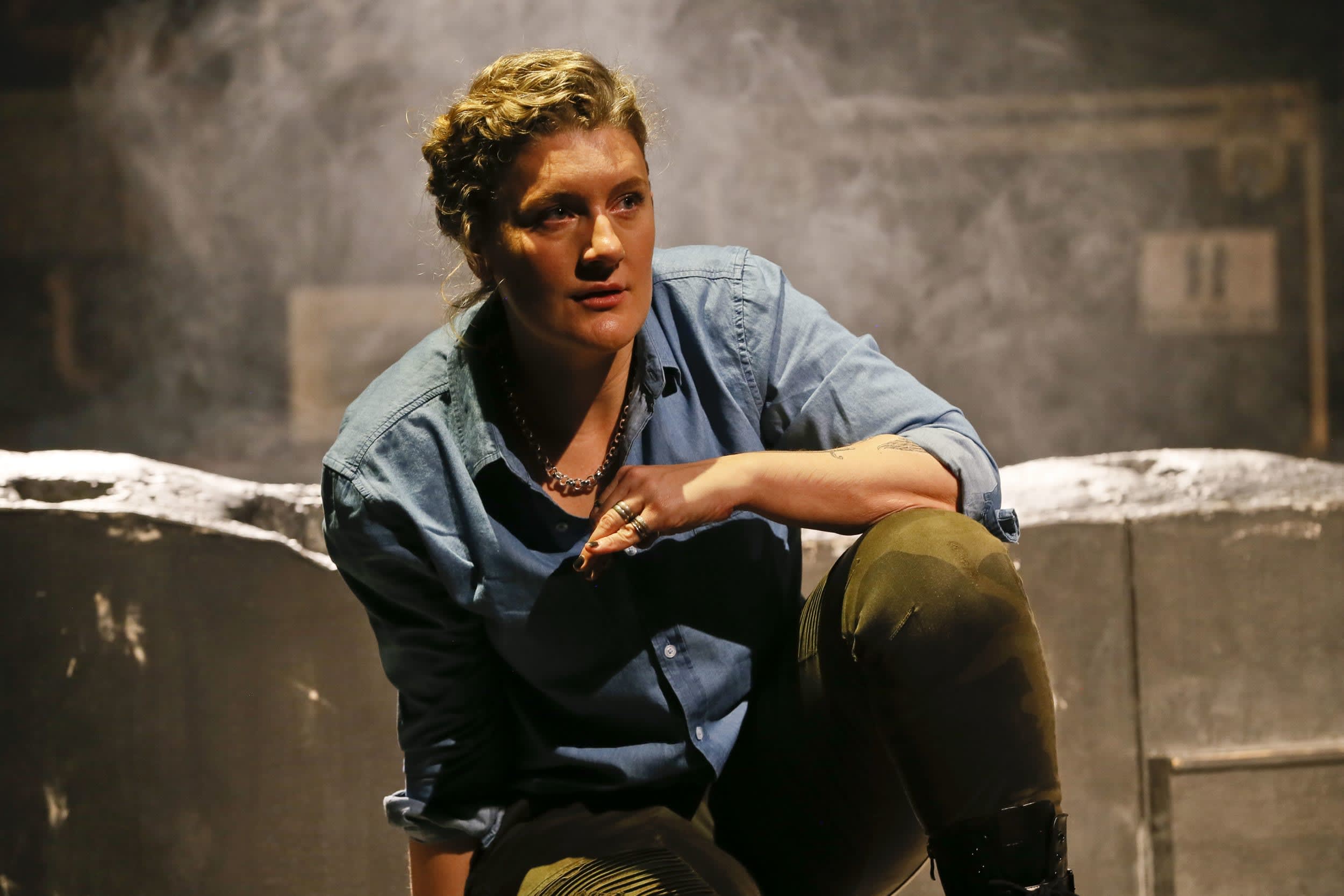
Virginia Gay in Cyrano. Photo: Jeff Busby
In Gay’s reimagined Cyrano the very presence of the cast also interrogates how we tell old stories. ‘The reason the story can be changed is because we have a diverse group of storytellers on the stage. Because different voices are fighting for different things and saying, “We will not accept this anymore”,’ Gay says. To explain further she starts talking about the actions of Cyrano. ‘The other thing that is abundantly true about this story is that what Cyrano does is wrong. It's really wrong.’ Gay explains that in the original he’s a perfect figure because it is a tragedy: ‘You can have perfect figures who are worn down by the world and end in tragedy.’ But in her romantic comedy, that doesn’t work. ‘I couldn’t have a Cyrano who is perfect, who ends happily, because one, there’s no tension there, no drama, and two, because their behavior is not perfect. It’s catfishing.’
Instead, Gay’s Cyrano is a complex figure, who has to learn and grow after doing problematic things, after making bad decisions born out of self-hate. And in order for that to occur, the story of the character who is hurt by Cyrano, Roxanne, had to change. ‘The fact that Roxanne comes back on and holds Cyrano to account, is the reason that the story can change. No Roxanne has ever come back on stage before. No Roxanne has ever stormed back and gone, “How dare you”. And that is a turning point – the note of possibility, that any ending is possible.’
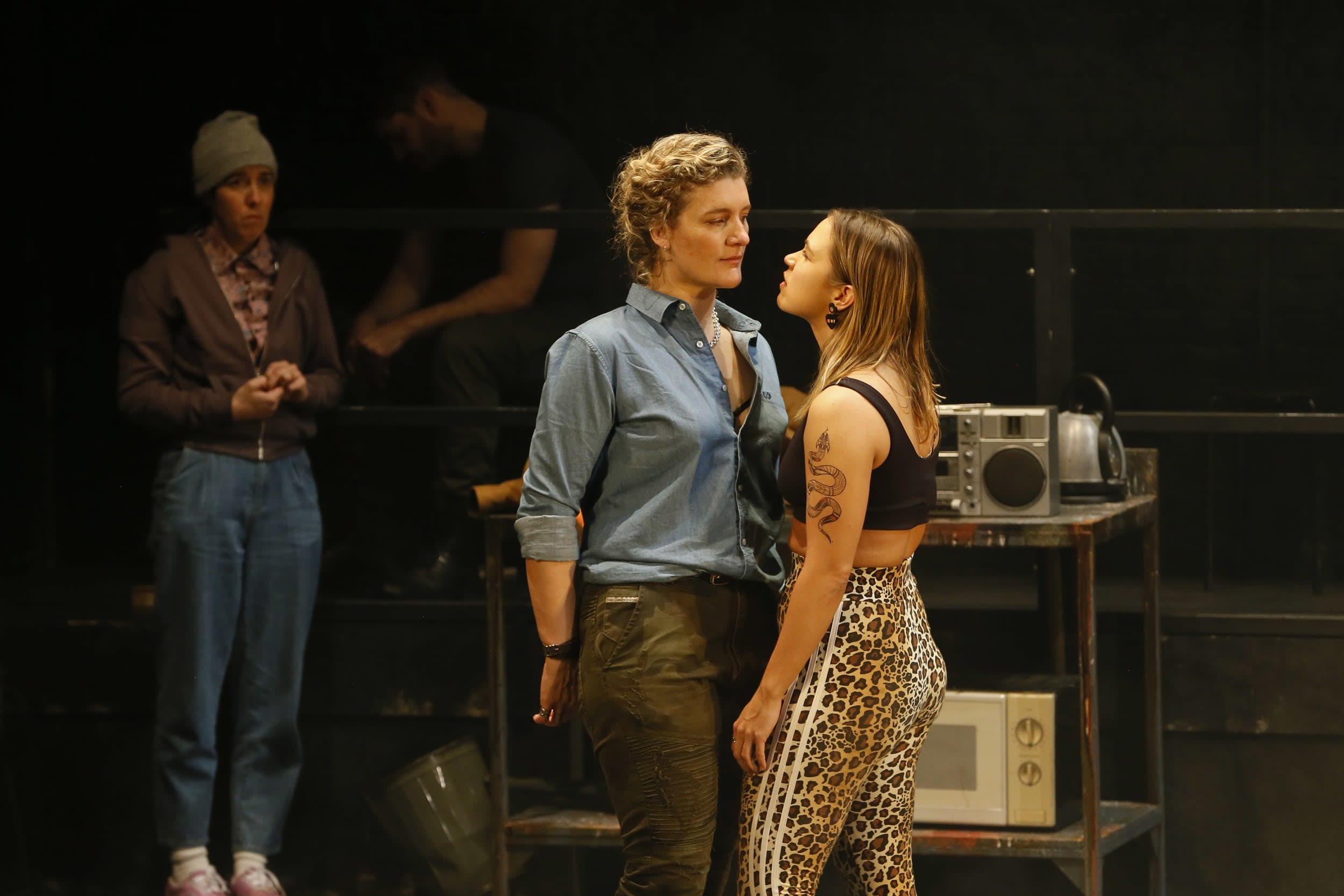
Virginia Gay and Tuuli Narkle in Cyrano. Photo: Jeff Busby
What’s so exhilarating for Gay is that it is actor Tuuli Narkle as Roxanne holding Cyrano to account. ‘Tuuli Narkle is a First Nations actor and a younger generation of queer performers too, who says, “I will not have these old stories, these stories do not serve us. I will fight for something better and I will hold you to account. This is not okay”.’
It’s the entire cast, in fact, that Gay is in awe of. ‘It's such an incredible cast. And we're all so agile and nimble and ready to try things.’ Which is indicative of the spirit of the show and where the character of Cyrano ultimately progresses to. ‘You have to let other people in. And you have to allow their voices to sing and you have to be like, “That's a good point.” Rather than, “I don't need you, I don't need your help”.’
As Director Goodes says, the show is about the ‘joy and love that the human experience brings you and the messiness of life. It can make you feel vulnerable, but ultimately it's going to make you connect with more people.’ A point that Cyrano undoubtedly reminds us is incredibly worthwhile, not just because of the last few years, but because that’s what life is about.
Cyrano is on stage until 29 October at Southbank Theatre.
Published on 19 October 2022


